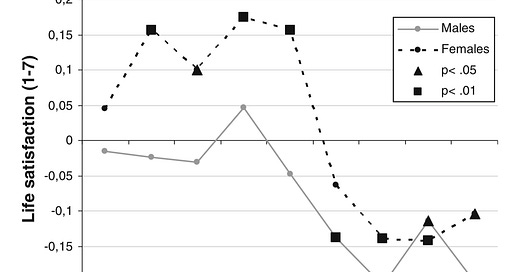The J-curve of parenting
Last Christmas I wrote a tongue-in-cheek paper on the economic research of happiness. Happiness research has become quite a sizeable field of scientific enquiry and there are many things that can be learned from this research that will help you enhance your life. One thing that tends to irk people, however, is that this research is pretty unanimous in its finding that having children does not make you happier. In fact, the evidence points to a clear deterioration of happiness for people who have children vs. people who don’t have children. Thomas Hansen has compiled the evidence and its contradiction to common beliefs in a paper in 2012. The chart below shows the example of British households in the years before and after having their first child (year 0). The steep drop in life satisfaction in the first two years after having their first child is hard to overlook and cannot be explained by other factors. The funny thing is that if you ask people if their children make them happy, they all say yes, but if you actually measure it in real time, you get the miserable outcome shown below. It remains a taboo in all societies to claim that your children make you miserable and that people without children are happier than people with children.
Happiness of British people before and after having their first child

Source: Hansen (2012).
But when I showed the paper I wrote last Christmas to a colleague, he argued that the research got it wrong. He readily admitted that having children leads to lower life satisfaction, but he argued that it was a J-curve effect. The true happiness comes with having grandchildren.
And it seems he has been on to something. There is now a growing amount of research that looks into the happiness of grandparents who take care of their grandchildren. The chart below shows some basic results from a European study that shows that older people who do not care for their grandchildren (either because they have none or because they are unwilling to) tend to have a lower self-reported state of happiness and health. The incidents of perceived ill health or depressions are significantly higher for this group of elderly people than for elderly who spend some time with their grandchildren but in a non-intensive way. Elderly people who have to provide more intensive care for their grandchildren (e.g. because they have to support a single parent) report somewhat worse health outcomes but are still better off than those who do not care for grandchildren. A more recent study demonstrated that the same is true for Chinese families.
Self-reported health for grandparents who do or do not care for grandchildren

Source: Di Gessa et al. (2015).
Overall then, I have to revise my opinion about having children. They are good for you and create happiness, but only if you can give them back after a while. The question I have to ask myself is, if I want to invest in something with a J-curve that is under water for 20 years or so before I see a return. And did I mention that the lock-up for this investment is also about 18 years or so? I am really not sure if this is the best investment I can think of.




